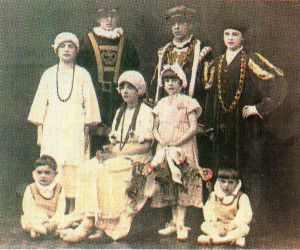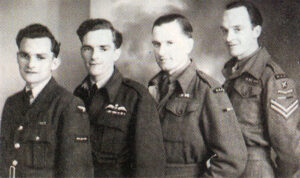
Although there was another sister, Eileen, as well as myself our family of nine children with seven boys amply illustrated the “boys will be boys” adage, even though father kept a close eye on their activities.
An example was provided one day when my parents were out for a walk. They met a local acquaintance who said: “My word, Mr. Dover, you’ve got a tribe of little varmints ‘aven’t ee? From a winder at the top of your house I ‘eard childish voices shouting ‘Tubby’, an’ when I looks up I sees a row of little backsides sticking out of the winder, as bare as when they was born.”
During the First World War my eldest brother Clifford (born in 1907) heard that a regiment of soldiers was due to march from Yeovil to Sherborne, about six miles, so along with the camp followers he set out with one of his youngest brothers walking by his side and another in a push chair. When my parents discovered that they were missing there was great confusion and police aid was sought. The three were eventually tracked down in Sherborne police station. No doubt father’s slipper later came into its own!
After the two eldest children had been baptised and confirmed in the church (Holy Trinity) next door to us, my father decided that all the remaining seven children (including me) should be christened. This multiple baptism took place in 1924, and what a commotion ensued! My youngest brother, Dennis, pulled off the vicar’s spectacles while in his arms and another litde one, Kenneth, amused the others by playing peep-bo through the backs of the pews.
All my brothers took active parts in the church’s interests as servers, choirboys and Scouts. The choir mistress, Ivy Priddle, would ‘fine’ the boys when they were late for choir practice or were being cheeky. Sometimes on pay day they discovered that they owed money because more had been subtracted as
‘fines’ than the small amount they normally received as choir pay. Even so, she had a large choir and trained the voices of many of her young group to a high standard. She and her husband Reg had no children of their own, but like Mr. Chips felt they had a vast family over the years. My brother, Roy, had an outstanding boy soprano voice and Ife frequently sang at public concerts, even at the Pump Rooms in Bath.

As active members of the Scouts my brothers, in addition to going away at their annual camps and doing much good work in the locality, helped put on each year an opera in the nearby Assembly Rooms, and together with Mr. Ring and his orchestra achieved wonderful success.
As it was an all-male cast the parts of the ‘girls’ of the chorus were taken by the choirboys and Cubs. However on one occasion I, as well as my seven brothers, took part, and my sister (ten years older than I) and one of my friends, Peggy Whensley, were the litde waiting maids. My brother Clifford, who had considerable artistic ability, spent many hours of his spare time creating and painting the ‘flats’ required for the scenery.
Clifford trained to be a painter and decorator and one day, during his apprenticeship, his clothes caught fire while he was using a blowlamp. A colleague, with great presence of mind, put out the flames by throwing him into a horse trough which was close at hand. Clifford eventually owned a firm of his own, employing many men, but his artistic gift never left him.
On one occasion he was asked to clean and restore an old painting, but in doing so he found that the lace cuffs of the cavalier portrayed had been done in a different medium from the rest of the picture and, in consequence, those cuffs disappeared during the cleaning! His wife found out that she
had a piece of old lace which Clifford dipped into paint and pressed on appropriate parts of the painting. No-one noticed any difference in the final appearance of that cavalier!
My father had a piece of land, used for growing vegetables, more than a mile away, and he had to climb Hendford Hill to approach it. He found this an ordeal as he grew older, so one Easter Saturday he persuaded two of my brothers to help him. Our local shoe repairer, Mr. Dicks, who kept a constant watch on the street activities through the window of his shop – especially the comings and goings of our long family -never failed to relate the events of that day without bursts of laughter.
He saw my father, in old clothes, set out with the tools for gardening and, some time later, Roy and Howard dressed as if they were going to a select party. Mr. Dicks wondered how much gardening they did for their father that day.
Most of the local tradesmen who delivered their goods from door to door had their carts pulled by horses, and my brothers earned a little extra money by helping them on their rounds. The one who escorted the baker was given a hunk of cheese and part of the top of a cottage loaf to eat on the front seat of the cart during their break; however, they were nearly gassed by the odours emitted from the horse’s rear!
Five of my brothers served during the Second World War. Clifford was a member of the Fire Service and had to help in many of the bombed towns and cities in the South. Howard and Roy were in the Army, and Ken (ground crew) and Dennis (pilot) served overseas in the RAF. They all returned safely, although constant concern about their wellbeing probably contributed to the stroke from which my father died in 1944.
Only one brother and I are left of those nine children. I’m sure it was the pattern provided by the Scouting Movement, the discipline set at school and the wonderful example shown by our parents (including the slipper!) that set us on the right road to pass through this life as caring people.
The love between the members of the family was illustrated by my brother John, who came dancing and with a bag of sweets into a room where, at ten years old, I was isolated with diphtheria and into which only my mother and sister were officially allowed to enter.
Kathleen Hawkins








